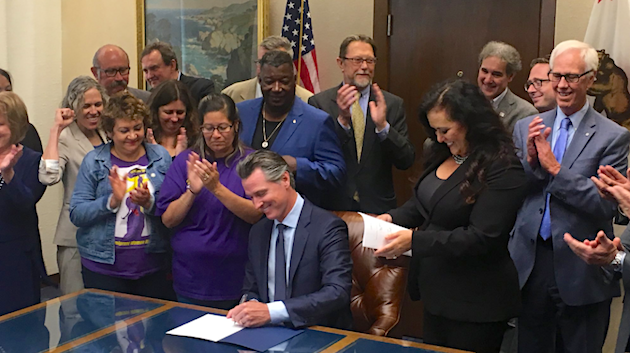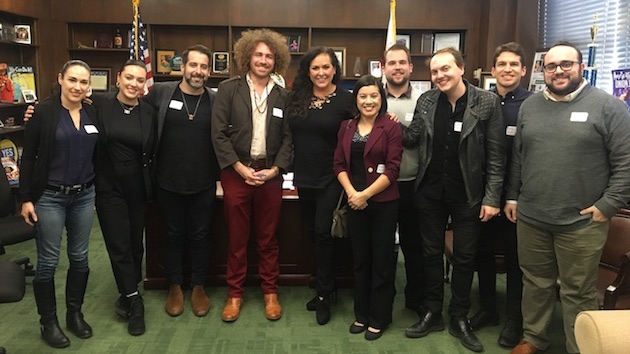
For musicians in California, suffering under the double whammy of COVID-19 and the destabilizing AB5 law, a proposed amendment offers hope for substantial (if far from complete) relief from the “gig law” … but only if the coronavirus danger eases up enough for lawmakers to return to Sacramento.
As musicians know, the law as currently enacted sharply curtails which workers can be classified as freelancers not eligible for employment benefits, which has had wide, unintended consequences in the arts and related fields.
Last weekend, press reports hailed the expected “relief to the vast majority of affected music professionals including recording artists, musicians, composers, songwriters, and vocalists.”
Exceptions to the amendment, however, would keep AB5 in force for hundreds of professional musicians, including symphony, opera, and ballet orchestras, musical groups regularly performing in a theme park setting, and musical-theater productions.
The state’s major music-industry representatives announced that they had reached agreement with Assemblywoman Lorena Gonzalez (D-San Diego) — author of Assembly Bill 5 — and Majority Leader Ian C. Calderon (D-Whittier) on amending AB5 with the proposed AB 1850 to change the bill’s provisions pertaining to the music industry. (Other professions — including doctors, lawyers, hair stylists, manicurists, accountants — managed to secure exemptions before the bill passed.)
Attempts to alter the law began almost simultaneously with its effective date of Jan. 1, 2020. Under a storm of protest against AB5, Gonzalez introduced legislation in January to continue working on the issues affecting musicians and a variety of other industries.
The problem with AB5 was that most employers, instead of hiring those previously working as freelance musicians, restructured and laid off their workers.

As described by Ari Herstand, an independent musician and artist advocate who is one of the organizers of the movement against AB5:
In the music industry, people stopped hiring California musicians and taking that work out of state, venues stopped having music altogether, community arts organizations that hosted small opera and musical productions began shutting down and canceling upcoming performances, artists, bandleaders, and singer-songwriters stopped hiring backup bands for their gigs.
“Composers stopped contracting musicians to record demos for their new works, contracting agencies which hired arrangers, musicians, librarians, orchestrators, recording studios, and recording engineers, had to shut down, artists stopped hiring recording engineers, and so on.”
It was, in short, a wholesale disaster.
The new language, which revises rules employers must use to determine whether workers are employees or independent contractors, has been agreed upon by the Recording Industry Association of America (RIAA), American Association of Independent Music (A2IM), Music Artists Coalition (MAC), Society of Composers & Lyricists (SCL), Independent Music Professionals United (IMPU), Songwriters of North America (SONA), American Federation of Musicians (AFM), the Recording Academy, International Allegiance of Theatrical Stage Employees (IATSE), Screen Actors Guild–American Federation of Television and Radio Artists (SAG-AFTRA), and the Teamsters.
At this point, however, nothing can change until the State Legislature reconvenes on May 4, the new tentative date set for resumption of all legislative hearings and meetings, after COVID-19 forced an adjournment on March 16. (Three days later, Gov. Gavin Newsom ordered all Californians to stay at home and leave only for essential trips.) If and when the legislature meets again and approves the amendments — as it’s expected to do — the new rules would become effective immediately.
AB 1850, the “clean-up bill,” will be presented as an urgent measure and, if it gets a two-third majority vote in both the Assembly and Senate, it will go into effect when the governor signs it. It would also be retroactive, so that those now violating AB5 would not be held responsible for it in the future.
The amendment would allow musicians to follow once again the Borello test to determine their independent contractor employment status for both live performances and studio recordings. The language also specifically preserves the right for unions to continue to organize the work of recording artists, musicians, singers, and others, ensuring that current and future collective bargaining agreements will continue to govern in California.

According to Herstand, this latest change provides valuable protections to California’s music industry. He leads the newly formed Independent Music Professionals United (IMPU) coalition. IMPU met with lawmakers, created a petition that received over 185,000 signatures, and actively worked on negotiating amendment language with all invested stakeholders.
“I had lots of sleepless nights to get musicians relief under AB5, but I’m happy we were able to come to an agreement,” he says. “As a songwriter and book author, I never thought that one of the most impactful things I’d ever have a hand in writing would be a law for the state of California. Life is funny sometimes.”
Recording Academy Chair and Interim President/CEO Harvey Mason Jr. is quoted as saying “With this exemption, music creators can get back to work on their own terms of collaboration. The history of music making in California has played a vital role in shaping the world’s culture, and we can now continue that for generations to come.”
Union leaders who previously supported AB5 and even proposed an attendance cap of 250 for concerts (above which performers would be bound by AB5’s ABC test) were willing to join the agreement.
About the exemptions to the amended bill, Sylvia Amorino, artistic director of Concord’s Solo Opera, told SFCV:
The long awaited new AB5 language “supposedly exempting musicians” does not seem fair. Opera, community theater, musical theater, symphonies, etc. are not exempt.
How is this fair: One night a musician can play in a rock band for a couple of hours and be exempt. Next night, same musician plays in an orchestra for one hour and is not exempt.
Why should a “band” be any different than an “orchestra”? In fact, the band may work together more often and resemble an employer/employee relationship. In opera or musical theater, an orchestra member or singer may come in for as little as one hour to two weeks a year to work with a company. And they are not exempt in this situation. It’s not fair, and this and COVID-19 will be the death of many small arts companies.”
And the AB5 follies continue.
CORRECTIONS: The full name of of the SAG-AFTRA organization mentioned above is the Screen Actors Guild–American Federation of Television and Radio Artists.




